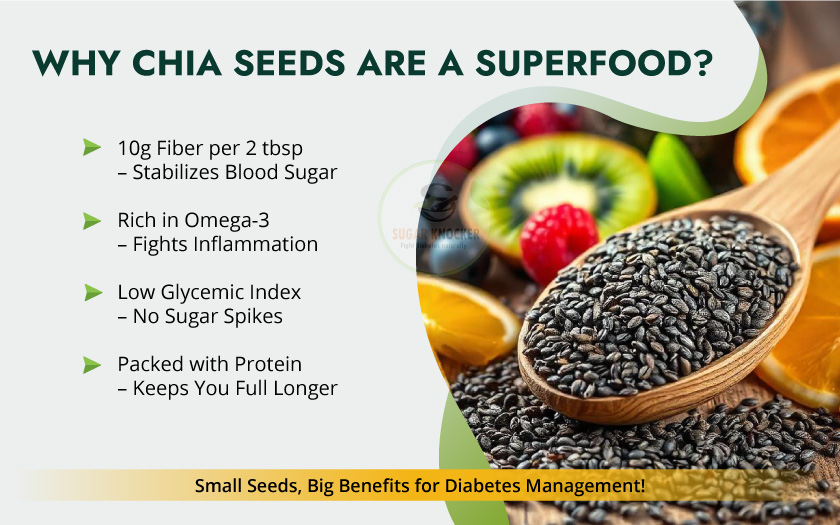
Is Chia Seed Good for Diabetes?
Managing diabetes is not just about medication—it’s also about making smart food choices that can naturally support your health. One such superfood is chia seeds. Tiny but incredibly powerful, chia seeds are loaded with nutrients that can help regulate blood sugar levels and improve overall health. In this blog, we’ll explore how chia seeds can benefit those with diabetes, highlight the scientific evidence behind their benefits, and discuss easy ways to incorporate them into your diet.
What Are Chia Seeds?
Chia seeds are tiny black or white seeds that come from the plant Salvia hispanica, native to Central and South America. Once a staple food for the Aztecs and Mayans, chia seeds are now recognized worldwide for their impressive nutritional benefits. They’re often referred to as a “superfood” due to their dense nutrient content, which is beneficial for various aspects of health, including diabetes management.
Nutritional Benefits of Chia Seeds
One of the reasons chia seeds are so popular is their exceptional nutritional profile. For a small serving size, they provide a powerhouse of nutrients:
- Fiber: Chia seeds are one of the richest plant-based sources of dietary fiber. Just 2 tablespoons contain about 10 grams of fiber, which is nearly 40% of your daily requirement. Fiber helps slow down digestion, stabilizing blood sugar levels and promoting gut health.
- Omega-3 Fatty Acids: These healthy fats reduce inflammation and improve heart health, which is crucial for people with diabetes.
- Protein: Chia seeds are a great plant-based source of protein, helping to reduce cravings and maintain muscle mass.
- Antioxidants: These protect your cells from damage caused by free radicals, which can worsen diabetes complications.
- Low Glycemic Index: Chia seeds have a low glycemic index, meaning they don’t cause a sharp spike in blood sugar levels after consumption.
How Chia Seeds Help in Diabetes Management

- Control Blood Sugar Levels
The high fiber content in chia seeds plays a significant role in regulating blood sugar. When soaked, chia seeds absorb water and form a gel-like substance. This gel slows down the digestion and absorption of carbohydrates, leading to more stable blood sugar levels after meals. - Improve Insulin Sensitivity
Insulin sensitivity is the body’s ability to use insulin effectively. Poor insulin sensitivity is a hallmark of type 2 diabetes. The omega-3 fatty acids in chia seeds are known to reduce inflammation and enhance insulin sensitivity, making it easier for your body to manage blood sugar. - Support Weight Management
Weight management is an essential part of diabetes care, and chia seeds can help. Thanks to their high fiber and protein content, chia seeds keep you feeling full longer, reducing overall calorie intake. Maintaining a healthy weight can improve blood sugar control and lower the risk of diabetes-related complications. - Improve Heart Health
People with diabetes are at a higher risk of heart disease. Chia seeds are rich in omega-3 fatty acids, fiber, and antioxidants, which collectively lower bad cholesterol (LDL), increase good cholesterol (HDL), and reduce blood pressure—key factors in maintaining heart health.
Research Supporting Chia Seeds for Diabetes
Scientific studies back up the many benefits of chia seeds for diabetes:
- A study published in Diabetes Care (2007) found that participants with type 2 diabetes who consumed 37 grams of chia seeds daily for 12 weeks experienced a significant reduction in blood sugar levels, blood pressure, and inflammation markers. The study also highlighted improvements in heart health, making chia seeds doubly beneficial for diabetics.
- Another study published in Nutrition Research and Practice (2021) showed that adding chia seeds to meals improved post-meal blood sugar levels and insulin response. This is due to the gel-forming properties of chia seeds, which slow down carbohydrate absorption.
How to Add Chia Seeds to Your Diet
Incorporating chia seeds into your diet is simple and versatile. Here are some easy ways to enjoy them:

- Chia Pudding:
Mix 2 tablespoons of chia seeds with 1 cup of milk (dairy or plant-based) and let it sit overnight in the refrigerator. Add fruits, nuts, or a drizzle of honey for a delicious, diabetic-friendly breakfast. - Smoothies:
Blend a teaspoon of chia seeds into your favorite smoothie for added fiber and omega-3s. - Chia Water:
Add 1 tablespoon of chia seeds to a glass of water, stir well, and let it sit for 15 minutes. This hydrating drink is perfect as a mid-day snack. - Sprinkled on Salads and Soups:
Use chia seeds as a topping for salads, soups, or even yogurt to add a crunchy texture and nutritional boost. - Baking:
Add chia seeds to whole-grain bread, muffins, or pancake batter for a fiber-rich treat.
Precautions When Consuming Chia Seeds
While chia seeds are safe and beneficial for most people, it’s important to consume them in moderation:

- Start Small: If you’re new to chia seeds, start with a small amount (1 tablespoon) and gradually increase to avoid digestive discomfort.
- Drink Plenty of Water: Chia seeds absorb water and can swell, so it’s essential to stay hydrated.
- Consult Your Doctor: If you’re on diabetes medication or have digestive issues, consult your doctor before adding chia seeds to your diet.
Frequently Asked Questions and Answers to Chia Seeds and Diabetes
Can chia seeds lower blood sugar levels?
Yes, chia seeds help stabilize blood sugar levels by slowing digestion and reducing post-meal glucose spikes due to their high fiber content.
How much chia seed should a diabetic consume daily?
Diabetics can safely consume 1-2 tablespoons (about 15-30 grams) of chia seeds daily, but it’s best to consult a doctor first.
Are chia seeds safe for type 1 diabetes?
Yes, chia seeds are safe for type 1 diabetics as they have a low glycemic index and help improve blood sugar control.
Do chia seeds improve insulin sensitivity?
Yes, omega-3 fatty acids and antioxidants in chia seeds can improve insulin sensitivity and reduce inflammation.
Can chia seeds help with weight management in diabetics?
Yes, the high fiber and protein content in chia seeds promote fullness, reducing calorie intake and aiding weight management.
What is the best way to consume chia seeds for diabetes?
Chia seeds can be soaked in water, added to smoothies, sprinkled on salads, or made into chia pudding for easy consumption.
Can chia seeds replace medication for diabetes?
No, chia seeds can complement but not replace diabetes medication. Always follow your doctor’s treatment plan.
Are there any side effects of eating chia seeds?
Excessive chia seeds may cause bloating or digestive discomfort. Start with small amounts and drink plenty of water.
Can chia seeds reduce the risk of diabetes complications?
Yes, chia seeds improve heart health, reduce inflammation, and help control blood sugar, lowering the risk of complications.
Are black and white chia seeds equally effective?
Yes, both black and white chia seeds offer the same nutritional benefits for managing diabetes.
Conclusion
So, is chia seed good for diabetes? The answer is a resounding yes! With their high fiber content, omega-3 fatty acids, and low glycemic index, chia seeds are a natural, affordable, and effective addition to a diabetic-friendly diet. Backed by scientific research and real-life success stories, these tiny seeds pack a big punch in managing blood sugar, improving heart health, and supporting weight management.
Start adding chia seeds to your diet today and take a small step towards better diabetes control. But remember, moderation and professional guidance are key.
Have you tried chia seeds for managing diabetes? Share your experience in the comments below!
